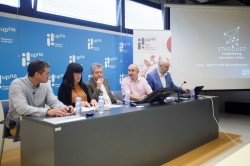Transforming academic research into more tangible actions for Smart Cities
From the 27th to the 29th of June, three STARDUST partners - Public University of Navarre (UPNA) Institute of Smart Cities, NASUVINSA and the National Renewable Energy Center (CENER) - took part in the annual meeting of the Network of Excellence in Smart Cities, CT-RTI (TIN2016-81766-REDT) (see meeting agenda in Spanish). They presented to the members of the CI-RTI network, a selected group of seven universities of Spain with active programmes around Smart Cities, what STARDUST is all about and how it plans to implement replicable Smart City solutions. All throughout the morning of June 29, 3 members of the STARDUST project described their objectives as well as the activities they carry out within the project. A general description of the STARDUST project was given by Sergio Díaz de Garayo from the Energy in Building Department of CENER. This was followed by an explanation by Professor Ignacio R. Matias from the Institute of Smart Cities regarding the role of university research - starting from doctoral research towards the real implementation of its results - in projects like STARDUST. In particular, Professor Matias described the development of a new procedure to analyse the characteristics of any new solution to be implemented in a Smart City. This “Smart City Tool” evaluates the different technologies available to city managers, policymakers and urban planners in a progressive implementation of a “Smart City”. Due to the multiplicity of factors involved, a comprehensive assessment is needed to analyse and evaluate whether a proposed solution is the most appropriate in terms of cost, public engagement and quality of life improvements for the citizens. According to the results, all the stakeholders could agree on a timeline for implementation of the new technologies. With the goal of boosting projects’ replicability, both speakers alongside Idoia Madariaga López, director of Innovation and Planning for the public society NASUVINSA, analysed the steps that need to be taken in order to transfer groundbreaking academic research into a Lighthouse project like STARDUST. Professor Matias shared his experience in this area and offered to collaborate with other universities that will develop similar tasks. This event was a great opportunity for STARDUST’s research institutions to showcase to the public the work done in universities and how academia can implement their results outside the four walls, thus allowing local communities to benefit from them.
Keywords
smart cities
Countries
Spain



